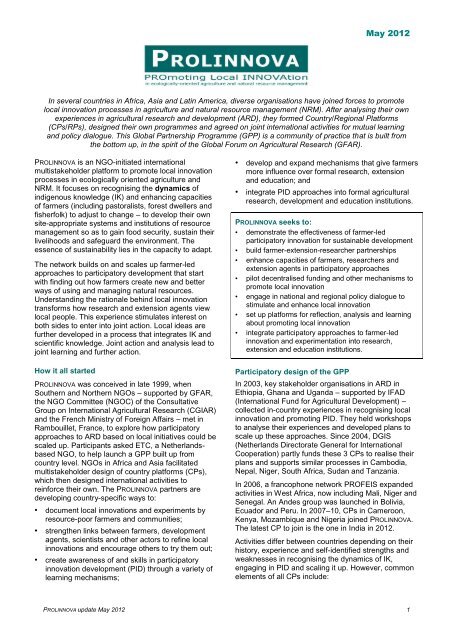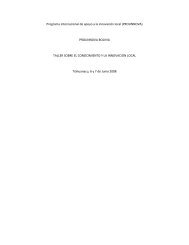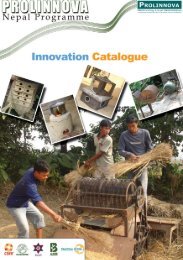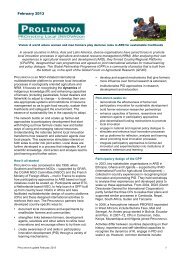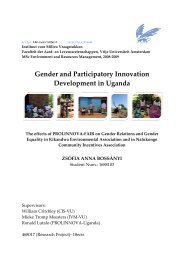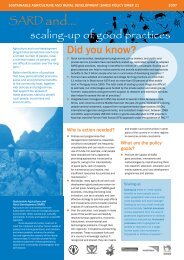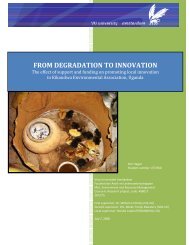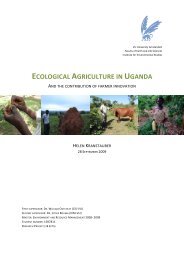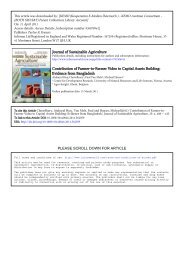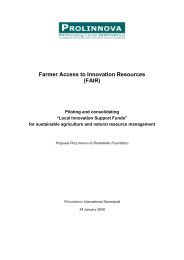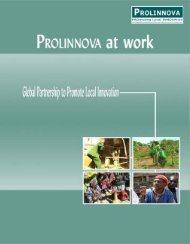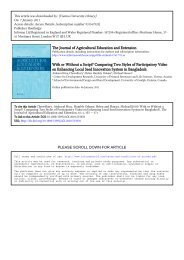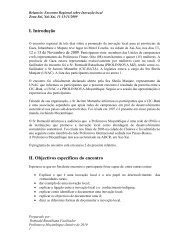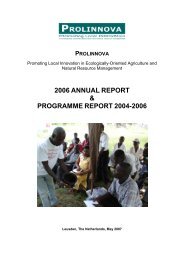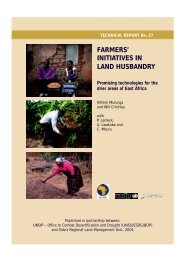May 2012 - Prolinnova
May 2012 - Prolinnova
May 2012 - Prolinnova
You also want an ePaper? Increase the reach of your titles
YUMPU automatically turns print PDFs into web optimized ePapers that Google loves.
<strong>May</strong> <strong>2012</strong><br />
In several countries in Africa, Asia and Latin America, diverse organisations have joined forces to promote<br />
local innovation processes in agriculture and natural resource management (NRM). After analysing their own<br />
experiences in agricultural research and development (ARD), they formed Country/Regional Platforms<br />
(CPs/RPs), designed their own programmes and agreed on joint international activities for mutual learning<br />
and policy dialogue. This Global Partnership Programme (GPP) is a community of practice that is built from<br />
the bottom up, in the spirit of the Global Forum on Agricultural Research (GFAR).<br />
PROLINNOVA is an NGO-initiated international<br />
multistakeholder platform to promote local innovation<br />
processes in ecologically oriented agriculture and<br />
NRM. It focuses on recognising the dynamics of<br />
indigenous knowledge (IK) and enhancing capacities<br />
of farmers (including pastoralists, forest dwellers and<br />
fisherfolk) to adjust to change – to develop their own<br />
site-appropriate systems and institutions of resource<br />
management so as to gain food security, sustain their<br />
livelihoods and safeguard the environment. The<br />
essence of sustainability lies in the capacity to adapt.<br />
The network builds on and scales up farmer-led<br />
approaches to participatory development that start<br />
with finding out how farmers create new and better<br />
ways of using and managing natural resources.<br />
Understanding the rationale behind local innovation<br />
transforms how research and extension agents view<br />
local people. This experience stimulates interest on<br />
both sides to enter into joint action. Local ideas are<br />
further developed in a process that integrates IK and<br />
scientific knowledge. Joint action and analysis lead to<br />
joint learning and further action.<br />
How it all started<br />
PROLINNOVA was conceived in late 1999, when<br />
Southern and Northern NGOs – supported by GFAR,<br />
the NGO Committee (NGOC) of the Consultative<br />
Group on International Agricultural Research (CGIAR)<br />
and the French Ministry of Foreign Affairs – met in<br />
Rambouillet, France, to explore how participatory<br />
approaches to ARD based on local initiatives could be<br />
scaled up. Participants asked ETC, a Netherlandsbased<br />
NGO, to help launch a GPP built up from<br />
country level. NGOs in Africa and Asia facilitated<br />
multistakeholder design of country platforms (CPs),<br />
which then designed international activities to<br />
reinforce their own. The PROLINNOVA partners are<br />
developing country-specific ways to:<br />
• document local innovations and experiments by<br />
resource-poor farmers and communities;<br />
• strengthen links between farmers, development<br />
agents, scientists and other actors to refine local<br />
innovations and encourage others to try them out;<br />
• create awareness of and skills in participatory<br />
innovation development (PID) through a variety of<br />
learning mechanisms;<br />
• develop and expand mechanisms that give farmers<br />
more influence over formal research, extension<br />
and education; and<br />
• integrate PID approaches into formal agricultural<br />
research, development and education institutions.<br />
PROLINNOVA seeks to:<br />
• demonstrate the effectiveness of farmer-led<br />
participatory innovation for sustainable development<br />
• build farmer-extension-researcher partnerships<br />
• enhance capacities of farmers, researchers and<br />
extension agents in participatory approaches<br />
• pilot decentralised funding and other mechanisms to<br />
promote local innovation<br />
• engage in national and regional policy dialogue to<br />
stimulate and enhance local innovation<br />
• set up platforms for reflection, analysis and learning<br />
about promoting local innovation<br />
• integrate participatory approaches to farmer-led<br />
innovation and experimentation into research,<br />
extension and education institutions.<br />
Participatory design of the GPP<br />
In 2003, key stakeholder organisations in ARD in<br />
Ethiopia, Ghana and Uganda – supported by IFAD<br />
(International Fund for Agricultural Development) –<br />
collected in-country experiences in recognising local<br />
innovation and promoting PID. They held workshops<br />
to analyse their experiences and developed plans to<br />
scale up these approaches. Since 2004, DGIS<br />
(Netherlands Directorate General for International<br />
Cooperation) partly funds these 3 CPs to realise their<br />
plans and supports similar processes in Cambodia,<br />
Nepal, Niger, South Africa, Sudan and Tanzania.<br />
In 2006, a francophone network PROFEIS expanded<br />
activities in West Africa, now including Mali, Niger and<br />
Senegal. An Andes group was launched in Bolivia,<br />
Ecuador and Peru. In 2007–10, CPs in Cameroon,<br />
Kenya, Mozambique and Nigeria joined PROLINNOVA.<br />
The latest CP to join is the one in India in <strong>2012</strong>.<br />
Activities differ between countries depending on their<br />
history, experience and self-identified strengths and<br />
weaknesses in recognising the dynamics of IK,<br />
engaging in PID and scaling it up. However, common<br />
elements of all CPs include:<br />
PROLINNOVA update <strong>May</strong> <strong>2012</strong> 1
<strong>May</strong> <strong>2012</strong><br />
developing inventories and databases of local<br />
innovations, innovators and organisations working<br />
together with them;<br />
bringing farmers, extensionists and scientists<br />
together to plan and implement joint experiments,<br />
starting from jointly prioritised local innovations;<br />
creating national and subnational multistakeholder<br />
platforms to share information about local<br />
innovation and to learn jointly about PID and its<br />
institutionalisation;<br />
building capacities to identify and document local<br />
innovation and to engage in PID, through training<br />
workshops for farmers, extensionists and scientists<br />
participatory monitoring and evaluation (PM&E) of<br />
joint activities, outcomes and impacts;<br />
creating awareness through innovator fairs,<br />
publications, mass media etc and engaging in<br />
policy dialogue with decision-makers in agricultural<br />
research, extension and education to create<br />
enabling conditions and policies for PID.<br />
At annual meetings since 2004, country-level partners<br />
define the international networking, learning and other<br />
support mechanisms needed to reinforce their work.<br />
Participatory planning at international level thus<br />
mirrors the approach at national and grassroots level:<br />
the partners develop and own a programme based on<br />
their self-defined needs and interests.<br />
Structure of the decentralised network<br />
In each country or region, a local NGO convenes the<br />
major ARD stakeholders. It serves as secretariat for a<br />
National Steering Committee (NSC) made up of<br />
people from government research, extension and<br />
education, other NGOs and farmer groups. The NSC<br />
defines the CP/RP activities, ranging from farmer-led<br />
research to policy dialogue; gives strategic guidance;<br />
helps mobilise resources; and is the apex structure for<br />
accountability. A smaller core team is responsible for<br />
coordinating implementation of CP/RP activities.<br />
The International Support Team (IST) supports the<br />
country and regional activities through network<br />
coordination, capacity strengthening, coaching, webbased<br />
information management, policy dialogue,<br />
networking and publishing. The IST comprises IIRR<br />
(Philippines), ETC AgriCulture (Netherlands) and the<br />
coordinators of the FAIR (Farmer Access to<br />
Innovation Resources), PROFEIS (Senegal) and<br />
HAPID (HIV/AIDS and PID, South Africa) initiatives.<br />
The PROLINNOVA Oversight Group (POG) serves as<br />
governance mechanism to ensure accountability of<br />
the GPP to the CPs, their constituencies and donors.<br />
The POG is made up of four people from CPs, one<br />
from the IST and three independent persons, elected<br />
by the CPs and the IST to serve two-year terms. The<br />
POG meets face-to-face at least once a year and<br />
communicates otherwise by email and Skype. It has<br />
drawn up several policies and guidelines for the GPP,<br />
which can be found on the PROLINNOVA website.<br />
PROLINNOVA Oversight Group (POG)<br />
Amanuel Assefa, Ethiopia (kidus_aman@yahoo.com)<br />
Assétou Kanouté, Mali (kalilouka@yahoo.fr)<br />
Marise Espineli (Co-Chair), Philippines<br />
(marise.espineli@iirr.org)<br />
Julian Gonsalves, India (juliangonsalves@yahoo.com)<br />
Sam Vitou, Cambodia (samvitou@cedac.org.kh)<br />
Scott Killough, USA (skillough@wn.org)<br />
Sergio Larrea, Ecuador (slarream@yahoo.com)<br />
Susan Kaaria (Co-Chair), Kenya (s.kaaria@fordfound.org)<br />
Secretariat: Ann Waters-Bayer & Chesha Wettasinha<br />
Participatory learning and mentoring<br />
In 2004, the first International Partners Workshop<br />
(IPW) was hosted by AgriService Ethiopia (ASE) /<br />
PROLINNOVA–Ethiopia. Local farmers explained how<br />
their innovations helped them achieve food security.<br />
Government and NGO participants from each CP<br />
shared experiences in farmer–extension–research–<br />
education partnerships and planned joint activities.<br />
In 2005, the IPW was hosted by Environmental Alert /<br />
PROLINNOVA–Uganda prior to FARA (Forum on<br />
Agricultural Research in Africa) General Assembly, so<br />
that PROLINNOVA partners could join the pre-plenary<br />
meeting to set up an NGO ARD consortium in Africa.<br />
The 2006 IPW was hosted by CEDAC / PROLINNOVA–<br />
Cambodia. Participants discussed their PID progress,<br />
Local Innovation Support Fund (LISF) pilots, process<br />
documentation and resource mobilisation.<br />
The 2007 IPW was hosted by PROFEIS / IED–Afrique<br />
in Senegal and the 2008 one by PROLINNOVA–Ghana,<br />
together with a writeshop on piloting LISFs. In 2009<br />
the IPW was hosted by LI-BIRD in Nepal, in 2010 by<br />
ETC Netherlands, in 2011 by PROLINNOVA–Tanzania<br />
and in <strong>2012</strong> by PROFEIS-Mali / ADAF-Gallè.<br />
Capacity-building is central to PROLINNOVA. IIRR gave<br />
international training in PID facilitation in the<br />
Philippines (2004), Uganda (2006), Ethiopia (2007)<br />
and Kenya (2009). The participants trained research<br />
and extension staff in their own countries.<br />
In 2006, PELUM (Participatory Ecological Land Use<br />
Management)–Tanzania gave an international course<br />
on policy dialogue. A mini-workshop on this was<br />
held at the 2007 IPW in Senegal. Further training in<br />
policy dialogue was given in 2009 in The Netherlands.<br />
A writeshop on gender issues in PID, based on the<br />
principle of learning through joint documentation by<br />
CP partners, was held in 2008 in Uganda.<br />
An M&E framework with guidelines for the global and<br />
local PROLINNOVA tracking of results was developed in<br />
2006. This framework is now under review, given the<br />
network’s new strategy direction. An international<br />
workshop to compare and learn from the M&E<br />
experiences was held in Ethiopia in mid-2010.<br />
South–South mentoring and cross-visits between<br />
CPs enhance mutual learning and strengthen<br />
capacities to build partnerships in ARD.<br />
PROLINNOVA update <strong>May</strong> <strong>2012</strong> 2
<strong>May</strong> <strong>2012</strong><br />
Thematic initiatives<br />
CPs with common interests in specific themes have<br />
joined forces in their own initiatives:<br />
• Local Innovation Support Funds (LISFs). Action<br />
research is underway in eight countries (Cambodia,<br />
Ethiopia, Ghana, Kenya, Nepal, South Africa,<br />
Tanzania and Uganda) to develop mechanisms to<br />
channel ARD funds to farmer innovators, so that they<br />
can further develop, document and promote their<br />
innovations and accelerate local innovation processes.<br />
After start-up support from DURAS (Promoting<br />
Sustainable Development in Agricultural Research<br />
Systems), co-funding is provided by Rockefeller<br />
Foundation through the FAIR (Farmer Access to<br />
Innovation Resources) programme.<br />
• Farmer-led documentation (FLD). Insight and<br />
COMPAS (Comparing & Supporting Endogenous<br />
Development) piloted participatory video in Ghana,<br />
where local innovators made films to share with other<br />
farmers and influence policy. In 2006, PROLINNOVA,<br />
PELUM–Uganda & Oxfam–Novib held an international<br />
FLD workshop in Uganda. FLD has been piloted in<br />
Burkina Faso, Ethiopia, Niger, South Africa and<br />
Sudan. The experiences were published in a booklet.<br />
• HIV/AIDS and PID (HAPID). In 2008–11 PROLINNOVA–<br />
SA coordinated action research in Mozambique and<br />
South Africa to explore implications of HIV/AIDS for<br />
PID and possibilities of using the approach in work<br />
with communities confronting HIV/AIDS.<br />
• PID and climate change. In 2008–10, partners in<br />
Ethiopia, Nepal and Niger studied how farmers /<br />
pastoralists, are innovating to adapt to climate change.<br />
A regional initiative on this topic has started with<br />
Misereor support in Cambodia, India and Nepal.<br />
Another is due to start in <strong>2012</strong> in eastern Africa.<br />
• Integration into education. To reinforce current<br />
activities in several CPs to integrate PID approaches<br />
into agricultural education and training, these CPs<br />
exchanged course designs and materials in 2009 at a<br />
workshop in Uganda, and jointly planned activities.<br />
Policy dialogue<br />
Often with GFAR support, PROLINNOVA takes part in<br />
numerous international ARD fora. At the 2003 GFAR<br />
meeting in Kenya, ASE told how the CP was set up in<br />
Ethiopia. At GFAR 2004 in Mexico, Environmental<br />
Alert presented PROLINNOVA–Uganda. At the 2005<br />
European Forum on ARD in Switzerland, LI-BIRD and<br />
Farmer Support Group presented their partnership<br />
experiences in Nepal and South Africa. At GFAR 2005<br />
in Morocco, POG Chair Betty Del Rosario and in 2006<br />
in the USA Laurens van Veldhuizen (IST) reported on<br />
PROLINNOVA progress. CEDAC presented Asian<br />
PROLINNOVA experiences to APAARI (Asia Pacific<br />
Association of Agricultural Research Institutions) in<br />
2006, and LI-BIRD to APAARI in 2007.<br />
At FARA’s 4 th General Assembly (GA) in 2007 in<br />
South Africa, PROLINNOVA–SA presented the GPP at<br />
an event organised by UK-funded Research Into Use<br />
(RIU) on “Overcoming Challenges in Scaling Out<br />
Agricultural Research Successes”. RIU funded smallscale<br />
farmers to prepare posters, brochures and video<br />
documenting local innovation, to showcase their work<br />
and to attend the FARA event. PROLINNOVA partners<br />
from Mali, Niger and the IST joined FARA’s 5 th GA in<br />
Ouagadougou in July 2010.<br />
Several PROLINNOVA partners joined the Farmer First<br />
Revisited conference in 2007 in the UK (www.farmerfirst.org).<br />
The GPP was strongly featured in the ISDA<br />
(Innovation for Sustainable Development in Agriculture<br />
& Food) symposium in June 2010 in France.<br />
POG Co-Chair Scott Killough attended the 1 st meeting<br />
of the Global Forum on Rural Advisory Services<br />
(GFRAS) in Chile in late 2010. A member of the IST<br />
attended the 2 nd GFRAS meeting in Nairobi in 2011.<br />
Wider sharing and learning<br />
Working with existing e-networks and databases,<br />
PROLINNOVA shares concepts and experiences in<br />
participatory innovation. To bridge the digital divide, it<br />
also disseminates printed matter and seeks links with<br />
other media, e.g. radio. Information about PROLINNOVA<br />
activities is spread through printed magazines (e.g.<br />
Farming Matters, Appropriate Technology, Rural<br />
Development News) and electronic newsletters.<br />
The PROLINNOVA website (www.prolinnova.net) is<br />
the main tool for wider sharing. The PROLINNOVA e-<br />
group serves as an open platform about ARD that<br />
builds on and enhances local innovation processes.<br />
PROLINNOVA collaborated with international research<br />
centres (CIAT-Africa, IFPRI and ILRI) and IIRR to hold<br />
the Innovation Africa Symposium in 2006 in<br />
Uganda. In 2009, it co-organised with CIAT-Asia and<br />
ICIMOD the Innovation Asia-Pacific Symposium in<br />
Nepal (see Resources on PROLINNOVA website).<br />
PROLINNOVA is part of the EU-funded research project<br />
“Joint Learning in Innovation Systems in African<br />
Agriculture” (JOLISAA) led by CIRAD (France) with<br />
partners in Benin, Kenya and South Africa. It works<br />
together with the EU-funded project Including<br />
Smallholders in ARD (INSARD) and is linked with<br />
the UNEP-funded project “Stimulating Community<br />
Initiatives in Sustainable Land Management” (SCI-<br />
SLM) in Ghana, Morocco, South Africa and Uganda.<br />
Sources of support<br />
After inception funding from IFAD, DGIS was the main<br />
donor. GFAR, CTA, French Ministry of Foreign Affairs,<br />
Rockefeller and Ford Foundations, ActionAid, EED<br />
(Church Development Service), Misereor, RIU and<br />
World Bank have supported specific activities or CPs.<br />
The partners in the IST and CPs cover over one third<br />
of total costs themselves. Funds are still sought for<br />
national multistakeholder platforms, new thematic<br />
initiatives and international innovation brokering.<br />
Some PROLINNOVA publications and papers<br />
Developing technology with farmers: a trainer’s guide for<br />
participatory learning. ZED Books, London, 1997 /<br />
reprint IIRR, Silang, 2004 (also in Spanish & Arabic)<br />
Farmer innovation in Africa: a source of inspiration for<br />
agricultural development. Earthscan, London, 2001.<br />
PTD for agricultural improvement: challenges for<br />
institutional integration. IIRR, 2002.<br />
Advancing PTD: case studies on integration into agricultural<br />
research, extension and education. IIRR, 2003.<br />
PROLINNOVA update <strong>May</strong> <strong>2012</strong> 3
<strong>May</strong> <strong>2012</strong><br />
IK Notes (World Bank 2004–06):<br />
70. Ethiopia: a woman innovator speaks<br />
71. Participatory video: rural people document their knowledge and<br />
innovations<br />
72. Regional radio in Tunisia<br />
74. Building multi-stakeholder partnerships to promote farmer<br />
experimentation and innovation in Ghana<br />
76. Promoting local innovation: enhancing IK dynamics and links<br />
with scientific knowledge<br />
77. Burkina Faso: indigenous innovation in farmer-to-farmer<br />
extension<br />
78. South Africa: a smallholders’ innovative approach to producing<br />
and exporting fruit<br />
85. Innovation Support Funds for farmer-led research<br />
96. Ethiopia: Endogenous and modern innovations<br />
PTD/PID Circular (since 1994)<br />
No. 13: Top Twenty publications on PID, 2004<br />
No. 14: Annotated list of journals, 2005<br />
No. 15: Electronic databases and websites, 2006<br />
No. 16: Local innovation and participatory R&D, 2007<br />
Participatory approaches to ARD / Farmer innovation as<br />
entry point to participatory research and extension / PTD<br />
where there is no researcher / Developing partnerships to<br />
promote local innovation. In: Sourcebook on participatory<br />
research and development for sustainable agriculture and<br />
natural resource management. CIP-UPWARD, 2005<br />
Facilitating multi-stakeholder partnerships. IIRR, 2006<br />
(booklet & policy brief 2010)<br />
Recognising local innovation. IIRR, 2008<br />
Innovation Africa. Earthscan, London, 2008<br />
Building partnerships to promote local innovation processes.<br />
In: Farmer First Revisited, London, 2009<br />
Farmer-led joint research. IIRR. 2010 (booklet & policy brief)<br />
Farmers take the lead in research and development. In:<br />
State of the World 2011: Innovations that nourish the planet,<br />
Worldwatch Institute, New York. 2011.<br />
Strengthening local resilience to climate change. 2011.<br />
Farmer-led documentation. IIRR. 2011.<br />
Providing farmers with direct access to innovation funds. In:<br />
Agricultural innovation systems. World Bank. <strong>2012</strong>.<br />
Innovation Asia–Pacific (in preparation with CIAT)<br />
CONTACT ADDRESSES<br />
Country Platforms<br />
BOLIVIA c/o Andean Programme for Food Sovereignty<br />
Contact: Sergio Larrea (slarream@yahoo.com)<br />
BURKINA FASO c/o Réseau MARP<br />
Contact: Mathieu Ouedraogo (patemathieu@yahoo.fr)<br />
CAMBODIA c/o Cambodian Centre for Study and<br />
Development in Agriculture (CEDAC)<br />
Contact: Yang Saing Koma / Sam Vitou<br />
(yskoma@cedac.org.kh / samvitou@cedac.org.kh)<br />
CAMEROON c/o COSADER & National Alliance against Hunger<br />
Contact: (Ms) Christine Andela (andelac@yahoo.com)<br />
ECUADOR c/o EkoRural<br />
Contact: Stephen Sherwood (ssherwood@ekorural.org)<br />
ETHIOPIA c/o AgriService Ethiopia (ASE)<br />
Contact: Amanuel Assefa (kidus_aman@yahoo.com)<br />
GHANA c/o Assoc. of Church-Based Devt Projects (ACDEP)<br />
Contact: Malex Alebikiya / Joe Nchor<br />
(amalex@acdep.org / nchorjoe@yahoo.com)<br />
INDIA c/o Institute of Himalayan Environmental Research &<br />
Education (INHERE)<br />
Contact: (Ms) Sonali Bisht (sonalibisht@yahoo.co.in)<br />
KENYA c/o World Neighbors (WN) / Kenya Agricultural<br />
Research Institute (KARI)<br />
Contact: (Ms) Teresiah Ng’ang’a (treazahwnganga@yahoo.com)<br />
MALI c/o ADAF-Gallè<br />
Contact: (Ms) Assétou Kanouté (adafgalle@afribone.net.ml)<br />
MOZAMBIQUE c/o Assoc. for Rural Community Devt (ADCR)<br />
Contact: (Ms) Gilda Fafitine / Romuald Rutazihana<br />
(gfafitine@yahoo.com / rutaromuald@hotmail.com)<br />
NEPAL c/o Local Initiatives for Biodiversity, Research and<br />
Development (LI-BIRD)<br />
Contact: Shreeram Neopane / Suman Manandhar<br />
(sneopane@libird.org / smanandhar@libird.org)<br />
NIGER c/o TATTALI / Regional Centre for Specialised<br />
Education in Agriculture (CRESA)<br />
Contact: Dan Lamso / Salaou Barmou / Adam Toudou<br />
(dnomaou@yahoo.fr / ppilda@intnet.ne / atoudou@refer.ne)<br />
NIGERIA c/o DRIVE (Development Resource Initiative)<br />
Contact: Yemi Adeleye (yemiolayemi@yahoo.com)<br />
PERU c/o Red de Acción en Agricultura Alternativa (RAAA)<br />
Contact: Héctor Velásquez (hvelasquez@raaa.org.pe)<br />
SENEGAL c/o AGRECOL–Afrique<br />
Contact: Djibril Thiam (thiamdjibril@yahoo.fr)<br />
SOUTH AFRICA c/o Institute of Natural Resources (INR)<br />
Contact: (Ms) Brigid Letty (bletty@inr.org.za)<br />
SUDAN c/o SOS Sahel Sudan<br />
Contact: Salih Eldouma / Ismail Elwali<br />
(saliheldouma@sahel.org.uk / elwali02@yahoo.com)<br />
TANZANIA c/o Participatory Ecological Land Use Management<br />
(PELUM)–Tanzania<br />
Contact: Donati Alex Senzia (info@pelumtanzania.org)<br />
UGANDA c/o Environmental Alert (EA)<br />
Contacts: Moses Sekate (mosesmsekate@yahoo.co.uk)<br />
International Support Team (IST)<br />
Farmer Access to Innovation Resources (FAIR)<br />
Contact: Laurens van Veldhuizen (l.van.veldhuizen@etcnl.nl) /<br />
Promoting Farmer Innovation and Experimentation in the<br />
Sahel (PROFEIS)<br />
Contact: Bara Guèye / Jean-Marie Diop<br />
(baragueye@orange.sn / jmldiop@gmail.com)<br />
International Institute of Rural Reconstruction (IIRR)<br />
Contact: (Ms) Emily Monville-Oro / (Ms) Marise Espineli<br />
(emily.monville@iirr.org / marise.espineli@iirr.org)<br />
ETC Foundation<br />
Contact: Laurens van Veldhuizen / (Ms) Ann Waters-Bayer /<br />
(Ms) Chesha Wettasinha / (Ms) Nicoliene Oudwater<br />
(l.van.veldhuizen@etcnl.nl / ann.waters-bayer@etcnl.nl /<br />
c.wettasinha@etcnl.nl / n.oudwater@etcnl.nl)<br />
Anyone can subscribe to the PROLINNOVA electronic listserver by contacting annie.secretario@iirr.org<br />
PROLINNOVA International Secretariat c/o ETC Foundation<br />
Kastanjelaan 5, POB 64, 3830 AB Leusden, Netherlands<br />
Tel +31-33-4326024 Fax +31-33-4940791<br />
Email: prolinnova@etcnl.nl Website: www.prolinnova.net<br />
PROLINNOVA update <strong>May</strong> <strong>2012</strong> 4


